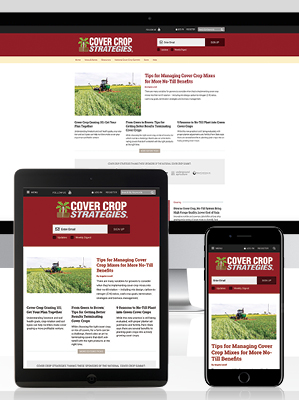Cover Crop Strategies editors encounter a variety of articles, social media posts, podcasts and videos that offer a unique look at various aspects of our great agricultural industry. Here is our favorite content from the past week:
- Five Generations on the Farm: Conservation, Crops & Commitment
- Perennial Clover Cover Crops and Managing Crop Rotations to Reduce Tillage
- Cover Crops: The Secret to Healthier Soil and Higher Yields in a Changing Climate
- Intensify Sorghum Systems with Double-Cropped Soybeans
- Why Aren’t Cover Crops Talked About More Often As A Climate Change Solution?
Five Generations on the Farm: Conservation, Crops & Commitment
Farming isn't just a job — it's a legacy. This fifth-generation farmer shares how his family has cared for the land since the 1830s, adopting conservation practices to keep the soil productive and in place. Learn about his approach to nitrogen management, crop rotation, no-till practices and how technology helps maximize efficiency while protecting the land for future generations.
Perennial Clover Cover Crops and Managing Crop Rotations to Reduce Tillage
This video from Climate Resilient Organic Vegetable Production, features Wisconsin grower Kat Becker as she discusses how she manages crop rotations on her diversified vegetable farm to reduce tillage, as well as Massachusetts grower Lincoln Fishman who shares how he manages his perennial clover cover crop system to minimize cash crop competition and maximize ecosystem benefits.
Cover Crops: The Secret to Healthier Soil and Higher Yields in a Changing Climate
Climate change is a global problem. As the ongoing changes happen, farming communities likely feel the impact more than most, with growing temperatures and sometimes volatile climatic conditions impacting their ability to ensure the soil quality maintains and increases their crop yields. Planting and growing cover crops during the fallow period following cash-produce harvests is one way to support and potentially improve soil quality.
Intensify Sorghum Systems with Double-Cropped Soybeans
Nitrogen and herbicide applications rank among the highest input costs in crop production. To help offset some of those expenses and realize environmental benefits, producers can introduce double-cropped soybeans or cover crops to no-till systems.
Why Aren’t Cover Crops Talked About More Often As A Climate Change Solution?
When we talk about climate change solutions, we often hear the same buzzwords: renewable energy, electric vehicles, recycling and cutting down on plastic. But what if there was an incredibly powerful climate solution that almost no one is talking about? Regenerative agriculture isn’t just another farming technique — it’s a revolutionary way of growing food that could reverse climate change, restore soil health and increase food security all at the same time. Yet, despite its enormous potential, it barely gets the mainstream attention it deserves.
Is there something you want to share in "This Week"? Send us an email.





